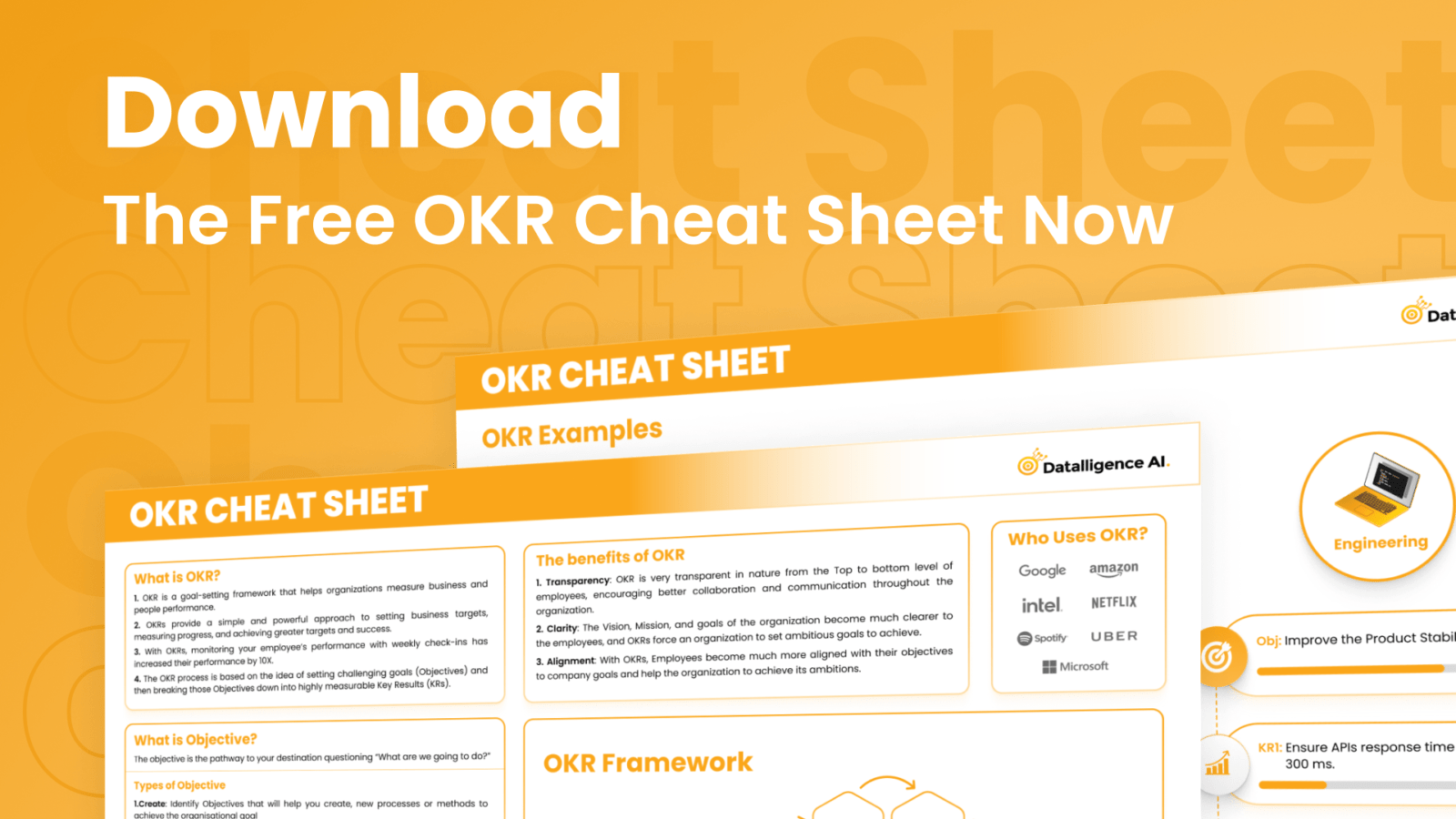Business performance management is a pivotal aspect of small businesses that determines their growth and success trajectory. It involves a strategic approach that aligns business objectives with employees' work, fostering productivity and operational efficiency. This comprehensive guide provides a deep dive into performance management, offering valuable insights, actionable strategies, and tools that small businesses can leverage for optimal results.
Table of Contents
What is performance management for small businesses?
For small enterprises, performance management is the main framework used to identify their weak points, opportunities for growth, and strengths. In essence, this process is crucial for small firms because it ensures that corporate strategic objectives are in line with business operations. Lack of this cohesion can significantly affect business performance and as well as stifle its growth since inefficiencies and missed opportunities may arise due to a disjoint between strategies and actual activities.
Performance management in small businesses also necessitates strict documentation of changes that have been effected within the organization. This practice is not just about keeping tabs on modifications but most importantly; it helps to explain how these adjustments impact company performance. The best way through which businesses can take informed decisions in the future is by determining how different changes influenced them in both negative and positive ways. This way, more efforts and resources can be channeled strategically towards initiatives that really influence business development.
Incorporating these practices into the performance management system small businesses ensures that businesses are not only able to identify areas that require improvement but are also equipped to take strategic actions that contribute to their long-term success and competitiveness in the market
Why is performance management for small business important?
In small enterprises, performance management is a tactful course of action that matches employee duties with business targets, merging internet tools such as OKRs to confirm that every team player’s undertakings have an impact on the company’s objectives. This arrangement forges better understanding and collaboration across all levels and provides unbiased evaluation metrics thus enabling justifiable appraisals of staff-members’ results. Importantly, a well-executed performance management system enables openness in communication with employees by providing useful information that guides proper judgments.
There are myriads of advantages of regular performance management. It, in turn, creates a more united team spirit by helping workers understand better how their job contributes to such goals. At the same time, it offers greater insight into possible process improvements and enables timely feedback that can be adjusted to suit needs. Burnout and employee turnover are minimized through this systematic approach; besides, it becomes a way for early anticipate problems early; therefore, it guarantees openness, fairness, and constancy in the feedback loop. Additionally, it helps to make improved hiring decisions thus improving further composition and efficacy of the team.
Small businesses can create an environment where continuous improvement is the norm by making performance management part of their operational strategy. This boosts both personal and team performance, positioning the company for long-term growth and success in a competitive market landscape.
The Relevance of Business Performance Management
Performance management is crucial for small businesses for several reasons:
- Alignment with Business Objectives: It ensures employees understand their roles and how they contribute to the company's success, helping to align individual and team goals with strategic business objectives.
- Enhanced Productivity: Regular feedback and goal-setting can motivate employees to perform their best. When employees understand their expectations and receive guidance for improvement, their productivity and efficiency increase.
- Employee Engagement: Engaged employees are more committed to their work and the organization. Performance management fosters engagement by providing a platform for voicing concerns, seeking help, and receiving recognition.
- Talent Development: Effective performance management helps identify and nurture talent within the existing workforce, reducing the need for external hires.
- Employee Retention: When employees feel valued and see growth opportunities within the company, they're less likely to look for alternatives. This can help small businesses retain their top talent.
- Employee Well-being: A well-structured performance management process considers employee well-being and work-life balance. It can help identify and address employee job satisfaction and mental health issues.
Benefits of Adopting Performance Management
Implementing a performance management system can yield numerous benefits for small businesses, contributing to their overall success and growth. Some key advantages include:
- Improved Employee Performance: A structured performance management framework provides clear expectations, feedback, and progress monitoring, leading to enhanced employee performance.
- Informed Decision-making: Performance data and metrics collected through the management process can guide strategic decisions related to staffing, training, resource allocation, and goal-setting.
- Legal Compliance: Proper documentation and adherence to performance management processes can help mitigate legal risks, providing a clear record of performance-related discussions and actions.
- Quality Improvement: Performance management can enhance product quality, service delivery, and customer satisfaction by identifying and addressing areas needing improvement.
- Adaptability: Performance management allows for quick identification and resolution of performance issues, enabling the business to adapt and thrive in a changing market environment.
- Competitive Advantage: Effective performance management can help attract and retain top talent, providing a competitive edge.
Components of Business Performance Management
There are several key components of a performance management system for small businesses:
- Goal Setting: This involves defining the objectives and goals of the business, ensuring they're SMART (Specific, Measurable, Achievable, Relevant, Time-bound) and understood by all employees.
- Performance Appraisals: These are regular assessments of employee performance, which may include formal annual or quarterly reviews or more frequent informal feedback sessions.
- Feedback and Coaching: Constructive feedback is provided to employees, identifying areas where they excel and where improvement is needed. Coaching and support are also offered to help employees develop their skills.
- Communication: Open and transparent communication is fostered with employees, encouraging them to voice their concerns and ideas for improvement.
- Flexibility: Due to the typically smaller number of employees in small businesses, it's important to adapt your approach to performance management to cater to your team's unique needs.
The Business Performance Management Cycle
The Performance Management Cycle (PMC) is a strategic approach to performance management that links the company's overall strategy and vision to the individual employees who support the realization of that vision. The PMC usually incorporates the following stages:
- Planning: Setting goals and defining SMART metrics
- Action: Achieving objectives and carrying out roles
- Monitoring: Tracking progress and providing feedback
- Reviewing: Evaluating the process, reviewing achievements, providing feedback, identifying learnings, and agreeing on actions
- Development: Offering opportunities for employees to develop and grow
- Reward: Recognizing and rewarding good performance
Each business is unique, so it's important to establish a PMC that fits your specific needs. A simple, straightforward approach is often best.
Effective Performance Management Practices
Effective performance management is crucial for small businesses to achieve their goals and maintain a motivated, productive workforce. Here are some tips to help implement successful performance management practices:
- Define clear expectations: Clearly define roles, responsibilities, and performance expectations for each employee. Use SMART goals and objectives to ensure clarity.
- Maintain regular communication: Schedule regular check-ins and feedback sessions between managers and employees, encouraging open and honest communication.
- Offer constructive feedback: Provide specific, actionable feedback on employee performance, focusing on both strengths and areas needing improvement.
- Set performance metrics: Establish key performance indicators (KPIs) to measure progress toward individual and organizational goals.
- Keep accurate records: Maintain records of performance discussions, feedback, and any performance improvement plans (PIPs).
- Encourage employee development: Provide opportunities for continuous learning and skill development.
- Recognize and reward: Acknowledge and reward outstanding performance with both financial incentives and non-monetary recognition.
- Implement performance improvement plans (PIPs): If an employee consistently underperforms, develop a clear and measurable PIP to address performance issues.
- Be flexible and adaptable: Adjust your approach to each employee's unique needs and circumstances.
- Train managers: Ensure managers are trained in performance management techniques, equipping them with the skills to motivate and support their teams.
The Role of Appraisals in Performance Management
Performance appraisals are a critical component of performance management. They provide a structured review of an employee's performance over a specific period, identify areas of strength and challenges, and set future objectives. Appraisals work best when they're viewed as interactive documents that facilitate discussion between managers and employees, rather than a form-filling exercise.
Implementing Effective Feedback and Coaching Practices
Implementing effective feedback and coaching practices within the framework of business performance management for small businesses is crucial for enhancing employee engagement, productivity, and overall business success. Regular, constructive feedback and personalized coaching sessions serve as key components in developing a motivated and competent workforce.
- Feedback Essentials:
-
-
- Offer feedback promptly, ensuring it is specific to behaviors and actions rather than personal attributes to prevent misunderstandings and conflicts.
- Utilize the Willing/Able – Unwilling/Unable Matrix to identify whether issues stem from an employee's ability or willingness, tailoring support accordingly.
- Encourage a two-way dialogue, allowing employees to express their views and participate in developing solutions, thereby fostering a sense of ownership and accountability.
-
- Coaching Strategies:
-
- Adapt coaching styles to meet individual employee needs, focusing on strengthening skills, encouraging self-assessment, and providing continuous support.
- Schedule regular meetings and coaching sessions to review progress, adjust strategies as needed, and maintain open lines of communication between managers and employees.
- Document coaching sessions and feedback to track development, set future goals, and ensure consistency in performance management practices.
These practices, when integrated into the performance management system for small businesses, not only drive employee engagement but also align individual efforts with the company’s strategic objectives, ultimately contributing to the business's growth and success.
Role of Training in Performance Management
Training is an essential aspect of performance management. It equips managers with the skills needed to effectively manage their teams, provide constructive feedback, and handle difficult conversations. An effective training program runs alongside the performance management process, ensuring that managers understand the interdependencies and tools needed for effective management.
Choosing the Right Performance Management Tools
When choosing the right performance management tools for small businesses, it's essential to consider the innovative capabilities and scalability that AI-powered software offers. AI-powered performance management software not only automates mundane and repetitive tasks but also ensures that employee efforts are aligned with the business strategy, significantly saving time and operational costs. For instance, automated reminders and notifications foster regular participation and engagement in performance management processes. Additionally, such systems can lead to a 38% increase in average profitability for enterprises by 2035, highlighting their potential impact on a small business's growth and efficiency.
Selecting a tool that fits the unique needs of a small business involves considering whether the software can be integrated as part of a broader HR suite or if a stand-alone application is more suitable. Performance management software like Homebase and BambooHR offer features tailored to small businesses, including goal setting, feedback, and performance reviews, with the added benefit of mobile accessibility and user-friendly interfaces. On the other hand, platforms like AssessTEAM and PerformYard provide customization and ease of use, catering to businesses looking for specific performance evaluation tools and feedback mechanisms.
Moreover, the scalability of AI-powered performance management software is a critical factor. As small businesses grow, their performance management system should adapt to increasing demands without compromising efficiency or effectiveness. Tools such as Lattice and Zoho People offer solutions for performance-based compensation planning and HR responsibilities, respectively, demonstrating the versatility and adaptability of these systems to meet evolving business needs.
Overcoming Challenges in Performance Management
Performance management can present several challenges, especially for small businesses. These may include a lack of resources for comprehensive training programs, resistance from employees, or difficulties in aligning individual performance with overall business objectives. However, these challenges can be overcome through a clear and well-structured performance management process, regular communication, constructive feedback, and continuous training and development.
Conclusion: Transforming Business Performance Management with Datalligence.ai
Throughout this discussion on Effective Business Performance Management for small businesses, we have explored a multifaceted approach to nurturing growth, enhancing employee satisfaction, and aligning strategic objectives. From understanding the essentials of performance management to the careful selection of AI-powered tools, setting achievable goals, and fostering a continuous learning culture, the strategies outlined serve as a blueprint for small business owners seeking to optimize operations and drive sustainable competitive advantage. Emphasizing the significance of effective feedback, coaching practices, and recognizing performance, we've highlighted how these elements collaboratively contribute to building a motivated workforce and achieving organizational success.
As we conclude, it’s clear that the journey towards effective performance management is ongoing, requiring dedication, adaptability, and continuous improvement. The implications of these practices stretch beyond immediate operational efficiencies to long-term business resilience and growth. Small businesses stand to benefit significantly from integrating these performance management strategies, thereby ensuring their place in an ever-evolving market landscape. To further enhance your business's performance management strategy, consider exploring solutions at Datalligence Onboarding, where innovative tools await to empower your small business in achieving its full potential.











